Chester Zoo bird keeper, Mark Vercoe, was one of twelve staff members that spent two weeks out in the field in Madagascar providing support to our conservation partners, Madagasikara Voakajy.
Mark’s main task was to survey the local birdlife found in the Mangabe forest and help to produce a list of species that could be used to develop a small eco-tourism income for the area via bird/wildlife watching tours and excursions. Here he tells us more:
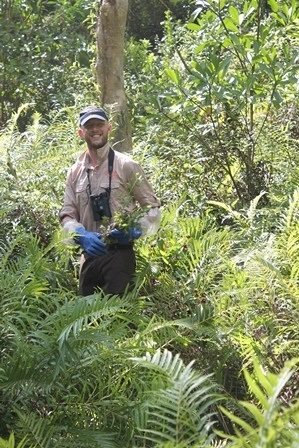
“My role in the zoo is very diverse but with one constant factor, feathers! While I write this I’m soaked to the skin and frozen, watching our pair of cassowary being introduced for the first time since they moved to their new enclosure in Islands last summer… neither of which, the weather nor the birds are particularly Madagascan but its going so well I keep finding myself thinking about all the amazing experiences I had during the expedition to Mangabe forest earlier this year!
“My role in the zoo as assistant team manager for both the bird sections meant I was fortunate enough to be selected as the avian expert during the trip and I was really looking forward to have the opportunity to see so many species of birds (and for that matter, mammals, herps, and plants) that exist nowhere else on earth.
“Knowing that we would be based in an isolated field camp, I was also looking forward to getting back to basics! My task whilst out in the forest was to survey the birdlife in the area and help to produce a list of species that could be used to develop a small eco-tourism income for the area via bird/wildlife watching tours and excursions. I work with a few bird species in the zoo that I could have expected to see but there were a lot more that I needed to know, so a few weeks before the trip I kept a field guide near by for some light bedtime reading.
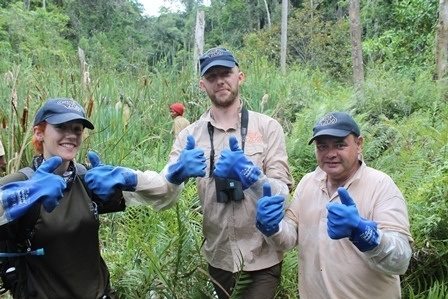
On the look out
“We landed in Tana late at night and with the exception of an unidentified owl and a few taxi drivers, the city slept. Waking up early in the morning my senses were bombarded, the smells from the fishmongers, butchers, street food stalls and exhaust fumes filled the air and the cockerels, dogs, car horns and excited school kids ensured I didn’t lie-in after only a few hours sleep. While in the capital we took the opportunity to visit the MaVoa office and meet the team, some of whom we’d be working with in the field, before grabbing supplies for camp and heading east on our way to our overnight stop in Moramanga.
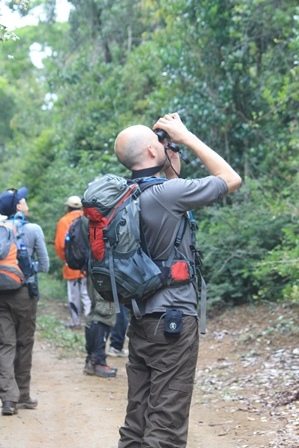
“From Moramanga the road to camp turned into a dirt track so it was time for us all to pile into 4×4’s, ‘off piste’ the driver said as we clattered around in the back! The 4x4s took us as far as the river, we crossed in a leaky long boat and after a short walk we had arrived at our camp on the edge of the forest. It was a beautiful spot and for the duration of our stay we would wake up to Indri calls and bird song (and snoring!), a welcome change to the hustle and bustle of the city.
“I was able to take part in all aspects of the field work, working with a local field guide, Tiana, we joined both the frog teams and primate teams as it gave us an opportunity to look for birds in different parts of the forest each day and night. Working in the forest was hard work, it was hot (44.8C at one point), humid and we often had to wind our way through dense vegetation, but it was always rewarded with great views of the wildlife we had travelled such a long way to see. A few of my highlights included the pygmy kingfisher, sunbird asity, blue coua and nuthatch vanga.
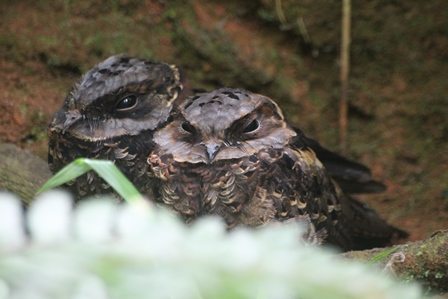 Collared nightjars
Collared nightjars
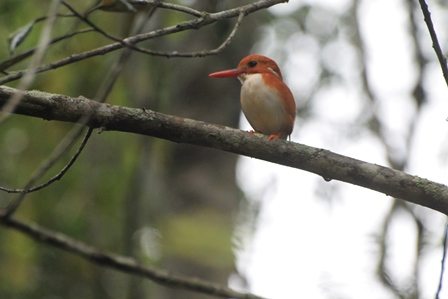 Pygmy kingfisher
Pygmy kingfisher
“The pygmy kingfisher was particularly special, it was one of the first endemic birds we saw, an adult keeping watch over its nest, and it was thanks to Kate, one of our Primate team that we saw it at all! During 6 days of surveying we managed to record 63 species and we suspect, having spoken to forest guides and local villagers that there are close to 100 species in the area.
“Madagascar is a truly unique country, the wildlife particularly. The pressures it faces are huge but so is the potential; the potential to better utilize the countries ecosystem services to benefit the people and the economy as well as the wildlife; the potential to be a thriving hub for eco-tourism and the potential to continue to halt and reverse so many species declines as Act for Wildlife work in partnership with teams like MaVoa to offer additional expertise and work force. I hope to return.”